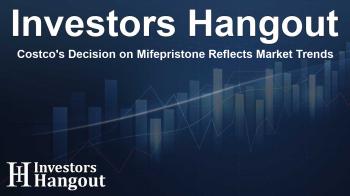Costco's Decision on Mifepristone Reflects Market Trends

Costco Wholesale Corp. Stands Firm on Mifepristone
Costco Wholesale Corp. (NASDAQ: COST) recently declared its decision not to stock the abortion pill mifepristone within its pharmacy locations across the United States. The company's stance is largely influenced by what it describes as insufficient demand from its members. This determination comes amid intense pressure from various activist groups targeting major retailers on social issues.
Understanding the Demand Dynamics
The warehouse retail giant maintains that its choice is firmly rooted in a lack of interest from customers. Many patients typically obtain mifepristone through their healthcare providers rather than at pharmacy retail chains. This insight, reported by several news outlets, indicates that Costco's decision is a reflection of market demand, which they assess within a broader social context.
The Rise of Activist Pressures
As the landscape of consumer goods evolves, companies face mounting pressure from activist organizations focused on various social causes. Religious organizations like Inspire Investing and Alliance Defending Freedom have initiated successful campaigns against corporate practices perceived as aligned with controversial social issues. These campaigns have influenced popular retailers, including Walmart and Kroger, alongside Costco, leading them to reevaluate their product offerings.
The Shift in Retail Strategy
Retailers are becoming more cautious in taking formal stances due to recent controversies that have sparked consumer boycotts and drawn negative media coverage. According to Arun Sundaram, a senior analyst at CFRA, many retailers are now opting for a more discreet approach to balance between consumer interests and socio-political issues. With the pressure intensifying, companies are compelled to weigh the risks of alienating customers against the potential benefits of taking a stand.
Abortion Trends and Legal Considerations
The current legal landscape regarding abortion has been irrevocably altered following significant Supreme Court rulings. Following the verdict on Dobbs v. Jackson, medication-induced abortions consist of a considerable majority of abortions performed, with recent data indicating a notable increase compared to prior years. This evolving legal episode frames the context within which Costco and other retailers operate.
Market Response and Company Performance
Costco's stock has shown resilience amid these developments, closing at $972.04 recently, despite a slight decrease. Over the past year, shares fluctuated between $867.16 and $1,078.23, highlighting the stock's volatility in response to market sentiments and geopolitical events. The company boasts a market capitalization exceeding $431 billion, with an impressive price-to-earnings ratio of 55.14.
Future Prospects for Costco and Retailers
As the retail landscape continues to change, Costco's approach might serve as a barometer for others in the industry. Observers are intrigued by how consumer behaviors will dictate future product offerings, especially concerning sensitive topics such as abortion. Retailers may need to adapt their strategies to align with market expectations while simultaneously managing activist influences effectively.
Frequently Asked Questions
Why has Costco decided not to sell mifepristone?
Costco cited low demand from its members and the understanding that most obtain the drug through medical providers.
What impact do activist groups have on retail decisions?
Activist groups can pressure retailers to reconsider or change their product offerings to align with social causes, leading to potential shifts in business practices.
How has the Supreme Court's ruling affected abortion trends?
Post-ruling, medication abortions have increased significantly, constituting a majority of terminations as individuals navigate new legal boundaries.
What does the market response indicate about Costco's future?
The resilience in Costco's stock suggests investor confidence, but ongoing socio-political pressures may require strategic adaptability.
How can consumers influence corporate policies?
Consumers can impact corporate policies through their purchasing decisions, advocacy, and participation in campaigns that align with their values, prompting companies to align with customer preferences.
About The Author
Contact Kelly Martin privately here. Or send an email with ATTN: Kelly Martin as the subject to contact@investorshangout.com.
About Investors Hangout
Investors Hangout is a leading online stock forum for financial discussion and learning, offering a wide range of free tools and resources. It draws in traders of all levels, who exchange market knowledge, investigate trading tactics, and keep an eye on industry developments in real time. Featuring financial articles, stock message boards, quotes, charts, company profiles, and live news updates. Through cooperative learning and a wealth of informational resources, it helps users from novices creating their first portfolios to experts honing their techniques. Join Investors Hangout today: https://investorshangout.com/
The content of this article is based on factual, publicly available information and does not represent legal, financial, or investment advice. Investors Hangout does not offer financial advice, and the author is not a licensed financial advisor. Consult a qualified advisor before making any financial or investment decisions based on this article. This article should not be considered advice to purchase, sell, or hold any securities or other investments. If any of the material provided here is inaccurate, please contact us for corrections.

